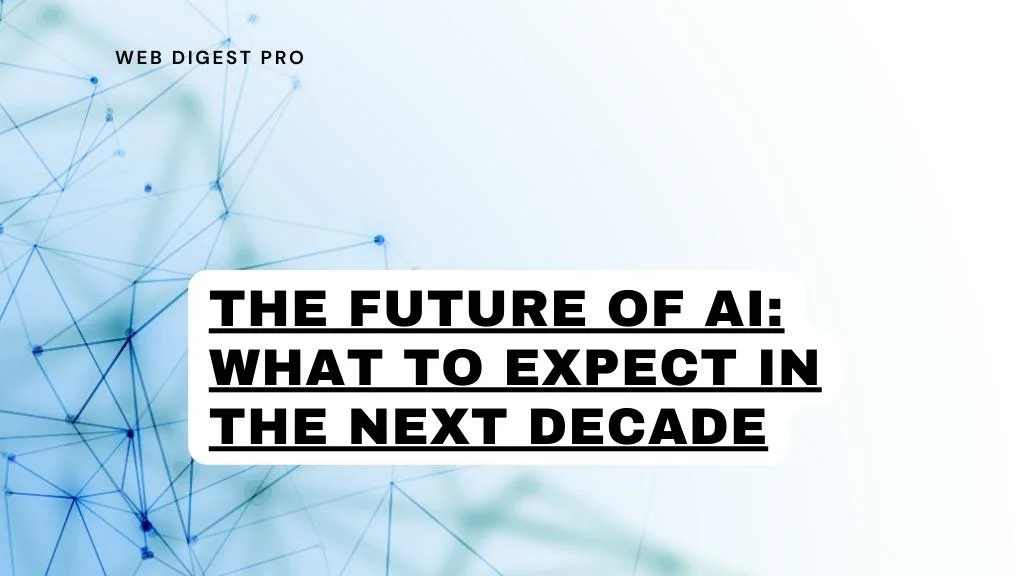Artificial Intelligence (AI) has rapidly evolved over the past decade, transforming industries, enhancing everyday life, and sparking both excitement and debate. As we look to the future, the next ten years promise to bring even more dramatic advancements. This article explores the key trends and developments we can expect in the world of AI, from technological innovations to ethical considerations and industry impacts.
Advancements in Machine Learning
Deep Learning Breakthroughs
Machine learning, particularly deep learning, has been at the heart of AI’s recent progress. Over the next decade, we can anticipate even more sophisticated models and algorithms. Deep learning will continue to evolve, with advancements in neural network architectures and training techniques. Expect improvements in natural language processing (NLP) that will make human-AI interactions more intuitive and efficient.
Advancements in neural network architectures will include the development of more sophisticated versions of existing models, such as enhancements in convolutional neural networks (CNNs) for better image and video processing and the integration of novel attention mechanisms that improve context understanding. The use of graph neural networks (GNNs) will gain traction, enabling more effective modeling of complex relationships in data represented as graphs. Furthermore, training techniques will become more advanced, incorporating methods like mixed-precision training to accelerate model training and continual learning to allow models to learn new tasks without forgetting previously acquired knowledge. The optimization of large-scale models will be enhanced through distributed training strategies, utilizing innovations in parallel processing and hardware accelerators like TPUs and GPUs. These advancements will contribute to more powerful and adaptable AI systems, capable of tackling increasingly complex and nuanced tasks.
AI Democratization
AI tools are becoming more accessible to non-experts. Platforms that simplify AI model creation and deployment will proliferate, enabling a broader range of industries and individuals to leverage AI for their needs. This democratization of AI could lead to a surge in innovative applications and solutions.
This trend is driven by the emergence of user-friendly platforms that offer low-code and no-code solutions, allowing users to design, train, and deploy machine learning models with minimal programming knowledge. Tools like AutoML frameworks are automating complex aspects of model selection and hyperparameter tuning, making advanced machine learning techniques more accessible. Additionally, the development of pre-trained models and transfer learning frameworks enables users to fine-tune existing models on domain-specific data, reducing the need for extensive computational resources and expertise. The proliferation of cloud-based AI services also supports this trend by offering scalable infrastructure and ready-to-use AI APIs, which streamline the integration of AI capabilities into applications. As these tools become more prevalent, we can expect a broader array of sectors, from small businesses to academic researchers, to harness AI technologies, leading to novel applications and solutions across diverse fields.
General AI
The concept of Artificial General Intelligence (AGI)—machines with the ability to understand, learn, and apply intelligence across a wide range of tasks at human-like levels—is still a distant goal. However, significant strides towards AGI are expected, with ongoing research focused on creating more flexible and adaptable AI systems.
Advancements in this area are likely to involve the development of meta-learning techniques that enable models to learn how to learn, allowing them to adapt quickly to new tasks with minimal data. Researchers are exploring architectural innovations such as neuro-symbolic systems, which combine neural network approaches with symbolic reasoning to enhance cognitive capabilities and generalization. Another promising area is multi-agent systems, where multiple AI agents work together and learn from each other, potentially leading to more robust and generalized problem-solving abilities. Cross-domain transfer learning will also play a critical role, allowing AI systems to apply knowledge gained in one domain to different, yet related, domains. Additionally, integrative cognitive architectures that mimic human cognitive processes, such as perception, reasoning, and decision-making, are being developed to create more holistic and versatile AI systems. These advances are paving the way towards AGI by making AI systems more capable of generalizing across various tasks and adapting to novel situations with increased flexibility and intelligence.
Ethical Considerations and Challenges
Bias and Fairness
As AI systems become more integrated into decision-making processes, ensuring that they operate without bias will be crucial. Future AI research will increasingly focus on developing techniques to detect, mitigate, and eliminate biases in algorithms. Creating fair and equitable AI systems will be a major challenge that the industry must address.
Privacy and Security
The rise of AI brings concerns about privacy and security. With AI systems capable of analyzing vast amounts of personal data, safeguarding this information will be critical. Future developments will likely include more robust privacy-preserving techniques and security measures to protect against misuse and breaches.
Ethical AI Design
The ethical implications of AI use, such as its impact on employment and decision-making, will be a focal point of discussion. Developing frameworks and guidelines for ethical AI design will be essential to ensure that AI technologies are used responsibly and for the benefit of society.
Impacts on Various Industries
Healthcare
AI’s impact on healthcare will be profound. Expect advancements in diagnostic tools, personalized medicine, and predictive analytics. AI-powered systems will enhance the accuracy of diagnoses, streamline administrative tasks, and provide tailored treatment plans based on individual patient data.
Finance
In the finance sector, AI will continue to revolutionize trading, risk management, and customer service. Algorithms will become more sophisticated in detecting fraudulent activities and optimizing investment strategies. Additionally, AI-driven chatbots and virtual assistants will enhance customer experiences and operational efficiency.
Transportation
Autonomous vehicles are set to become more prevalent, with advancements in AI making self-driving cars safer and more reliable. Beyond personal transportation, AI will play a crucial role in optimizing logistics, improving traffic management, and reducing transportation-related emissions.
Education
AI will transform education by offering personalized learning experiences and automating administrative tasks. Intelligent tutoring systems and adaptive learning platforms will provide tailored educational content and support, catering to individual learning styles and needs.
Entertainment
In the entertainment industry, AI will continue to drive innovation in content creation and distribution. From generating realistic CGI characters to personalizing content recommendations, AI will enhance the creative process and tailor entertainment experiences to individual preferences.
Conclusion
The next decade in AI promises to be transformative, marked by significant technological advancements and complex ethical challenges. As AI continues to evolve, it will impact various industries, shaping the way we live and work. Staying informed about these developments will be crucial for navigating the future of AI and harnessing its potential for positive change.
Written by Dimitrios S. Sfyris, developer and founder of AspectSoft, a software company specializing in innovative solutions. Follow me on LinkedIn for more insightful articles and updates on cutting-edge technologies.
Subscribe to our newsletter!














+ There are no comments
Add yours